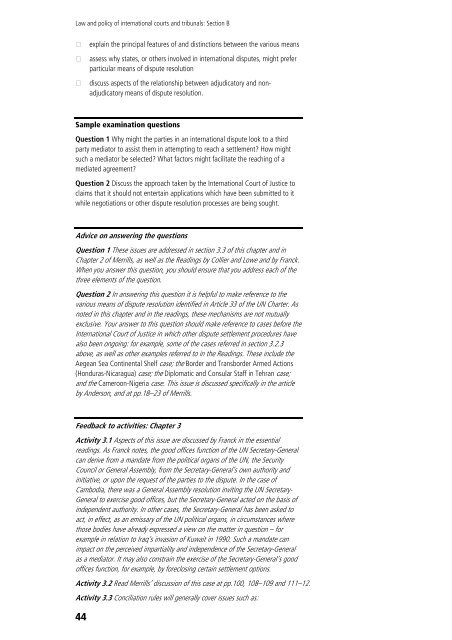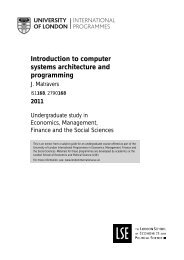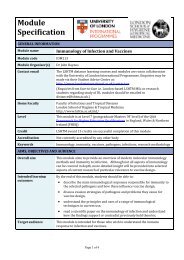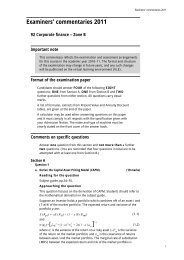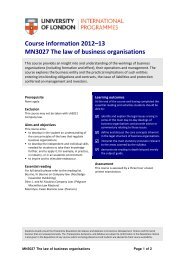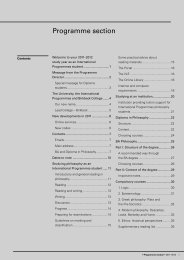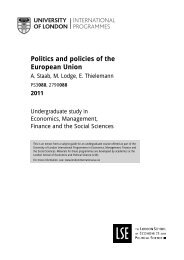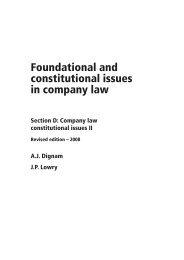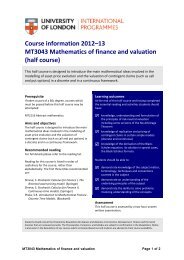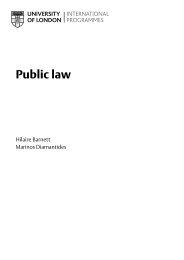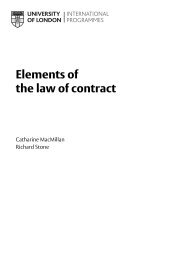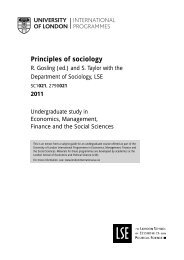Law and policy of international courts and tribunals - University of ...
Law and policy of international courts and tribunals - University of ...
Law and policy of international courts and tribunals - University of ...
You also want an ePaper? Increase the reach of your titles
YUMPU automatically turns print PDFs into web optimized ePapers that Google loves.
<strong>Law</strong> <strong>and</strong> <strong>policy</strong> <strong>of</strong> <strong>international</strong> <strong>courts</strong> <strong>and</strong> <strong>tribunals</strong>: Section B<br />
44<br />
explain the principal features <strong>of</strong> <strong>and</strong> distinctions between the various means<br />
assess why states, or others involved in <strong>international</strong> disputes, might prefer<br />
particular means <strong>of</strong> dispute resolution<br />
discuss aspects <strong>of</strong> the relationship between adjudicatory <strong>and</strong> nonadjudicatory<br />
means <strong>of</strong> dispute resolution.<br />
Sample examination questions<br />
Question 1 Why might the parties in an <strong>international</strong> dispute look to a third<br />
party mediator to assist them in attempting to reach a settlement? How might<br />
such a mediator be selected? What factors might facilitate the reaching <strong>of</strong> a<br />
mediated agreement?<br />
Question 2 Discuss the approach taken by the International Court <strong>of</strong> Justice to<br />
claims that it should not entertain applications which have been submitted to it<br />
while negotiations or other dispute resolution processes are being sought.<br />
Advice on answering the questions<br />
Question 1 These issues are addressed in section 3.3 <strong>of</strong> this chapter <strong>and</strong> in<br />
Chapter 2 <strong>of</strong> Merrills, as well as the Readings by Collier <strong>and</strong> Lowe <strong>and</strong> by Franck.<br />
When you answer this question, you should ensure that you address each <strong>of</strong> the<br />
three elements <strong>of</strong> the question.<br />
Question 2 In answering this question it is helpful to make reference to the<br />
various means <strong>of</strong> dispute resolution identified in Article 33 <strong>of</strong> the UN Charter. As<br />
noted in this chapter <strong>and</strong> in the readings, these mechanisms are not mutually<br />
exclusive. Your answer to this question should make reference to cases before the<br />
International Court <strong>of</strong> Justice in which other dispute settlement procedures have<br />
also been ongoing: for example, some <strong>of</strong> the cases referred in section 3.2.3<br />
above, as well as other examples referred to in the Readings. These include the<br />
Aegean Sea Continental Shelf case; the Border <strong>and</strong> Transborder Armed Actions<br />
(Honduras-Nicaragua) case; the Diplomatic <strong>and</strong> Consular Staff in Tehran case;<br />
<strong>and</strong> the Cameroon-Nigeria case. This issue is discussed specifically in the article<br />
by Anderson, <strong>and</strong> at pp.18–23 <strong>of</strong> Merrills.<br />
Feedback to activities: Chapter 3<br />
Activity 3.1 Aspects <strong>of</strong> this issue are discussed by Franck in the essential<br />
readings. As Franck notes, the good <strong>of</strong>fices function <strong>of</strong> the UN Secretary-General<br />
can derive from a m<strong>and</strong>ate from the political organs <strong>of</strong> the UN, the Security<br />
Council or General Assembly, from the Secretary-General’s own authority <strong>and</strong><br />
initiative, or upon the request <strong>of</strong> the parties to the dispute. In the case <strong>of</strong><br />
Cambodia, there was a General Assembly resolution inviting the UN Secretary-<br />
General to exercise good <strong>of</strong>fices, but the Secretary-General acted on the basis <strong>of</strong><br />
independent authority. In other cases, the Secretary-General has been asked to<br />
act, in effect, as an emissary <strong>of</strong> the UN political organs, in circumstances where<br />
those bodies have already expressed a view on the matter in question – for<br />
example in relation to Iraq’s invasion <strong>of</strong> Kuwait in 1990. Such a m<strong>and</strong>ate can<br />
impact on the perceived impartiality <strong>and</strong> independence <strong>of</strong> the Secretary-General<br />
as a mediator. It may also constrain the exercise <strong>of</strong> the Secretary-General’s good<br />
<strong>of</strong>fices function, for example, by foreclosing certain settlement options.<br />
Activity 3.2 Read Merrills’ discussion <strong>of</strong> this case at pp.100, 108–109 <strong>and</strong> 111–12.<br />
Activity 3.3 Conciliation rules will generally cover issues such as:


